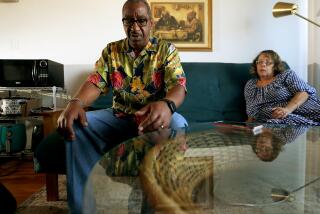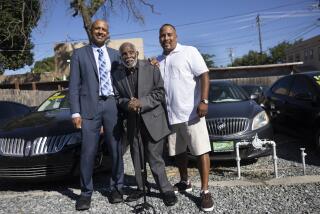Washington Town Warily Welcomes an Unusual Graduate
- Share via
SHELTON, Wash. — On Thursday night, in a small, back room of the local Burgermaster restaurant, a group of neighbors welcomed the man who plans to be the town’s newest transplant from California: convicted sex offender Brian DeVries.
The people of this rural town of 8,500 welcomed him with questions, condemnations -- and a promise of intense scrutiny. At the end of the meeting, his new neighbors said they were willing to give him a chance. Legally, they had no choice.
DeVries, 45, the first man to graduate from California’s violent sex-offender treatment program, moved to Washington state on Monday, hours after being granted unconditional release by a Santa Clara County judge.
He served sentences for molesting nine boys -- although he admitted molesting at least 50. He then underwent seven years of treatment in a program for violent sex offenders at Atascadero State Hospital. He underwent voluntary surgical castration in 2001.
Some residents of Shelton echoed Washington Gov. Gary Locke’s denunciation of DeVries’ release. Locke, in a statement, called the decision “outrageous.” California, he said, had abandoned its responsibility to watch over one of its most dangerous sex predators.
DeVries was required to register with local police, which he did just days after arriving at his father’s house near Olympia, about 18 miles southeast of here.
His plan, according to police, is to fix up an old trailer on some family property in the Shelton area and move in as soon as possible. Devries, with the help of his father, Barry, initiated contact with local residents, saying he wanted to meet with them before he moved into the area.
Resident Sherry Smith, founder of Parents Against Sex Offenders, led a successful campaign last year to thwart Devries’ earlier plan to move to Shelton. Some of DeVries five siblings live in the region, as do his parents, who are divorced.
She organized the Thursday meeting, which was attended by about 15 neighbors and a detective from the Mason County Sheriff’s Office. Devries, who is 6-foot-4 and weighs 245 pounds, sat in a small chair and meekly answered questions, some of them stinging.
“How will you keep yourself safe?” one woman asked him.
He replied that he was newly committed to his Christian faith, intended to keep his impulses in check and planned to have somebody accompany him to public places, such as supermarkets. Then DeVries added: “I don’t know. Will people ever feel at ease around me?”
One man answered: “No. I never will. I don’t feel at ease looking at your face.”
Thurston County Det. Daryl Leischner said he would check on DeVries once a week for as long as he lived with his father in Olympia. Mason County Det. Bill Adam said he would check on DeVries once a month after he moved to the Shelton area. Mason County, with a rural population of about 54,000 people, has about 200 registered sex offenders. Of that number, 18 are considered Level 3 offenders, considered potentially the most dangerous.
DeVries is a Level 3 offender. But both Leischner and Adam said DeVries appeared to be sincere in trying to live an upright life.
“I hate to say it,” Leischner said, “but this is a case where only time will tell.”
Under a 1996 California law, sexual offenders considered too dangerous to be released can be held in state mental hospitals after serving their prison sentences. They can be re-committed every two years or win release after successfully completing the treatment program. Washington state has a similar law.
For the last year, DeVries lived under supervision in a trailer on the edge of the Correctional Training Facility at Soledad in Monterey County. He ended up there after more than 100 landlords in the Santa Clara area refused to rent to him during the outpatient part of his treatment. A plan to release him into the custody of his father in Olympia was turned back after Locke and the Washington state attorney general threatened legal action.
As part of his supervised treatment in Monterey, DeVries was required to participate in therapy, to register with police every 90 days, to submit to random searches and drug testing, and to wear a tracking device.
His public defender, Brian Matthews, said that if DeVries had not gone through treatment, he could have spent the rest of his life at Atascadero.
Just before the court unconditionally released him, Santa Clara Superior Court Judge Robert Baines told him: “Good luck, Mr. DeVries, and for God’s sake, don’t prove me wrong.”
More to Read
Sign up for Essential California
The most important California stories and recommendations in your inbox every morning.
You may occasionally receive promotional content from the Los Angeles Times.













